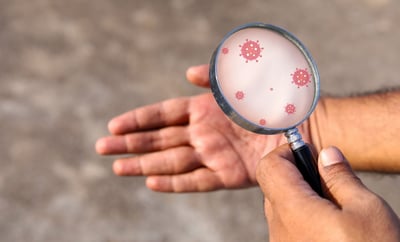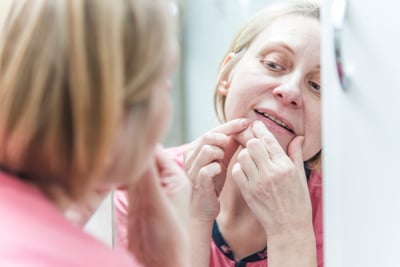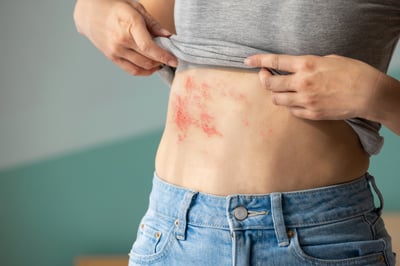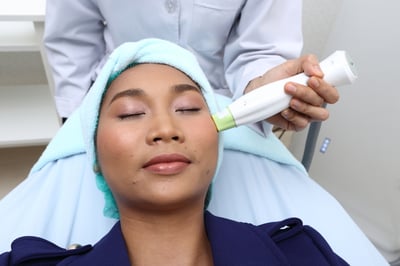
When “tips” get repeated enough times people start to believe they are the truth. In reality, it can be some of the worst advice you are living by. When it comes to your skin health, the myths are everywhere. Dr. Todd Rickett, a board-certified dermatologist with Forefront Dermatology, breaks down common skin advice to not live by – and why!
Myth: You need to soak up the sun to get Vitamin D.
Advice: “Sitting in the sun is not the only way to get your vitamin D,” stated Dr. Rickett. “Sun exposure actually causes skin damage that over time leads to wrinkles and skin cancer. Instead, find vitamin D in natural food sources including fish, shrimp, or mushrooms. Some foods are fortified with Vitamin D, such as milk and cheese. Vitamin D3 supplements are another good option for making sure you are getting a healthy amount of Vitamin D.”
Myth: Putting toothpaste on my zit will make it go away faster.
Advice: “This home remedy seems appealing since you can use the toothpaste you already have to try spot treating. However, there is no evidence that this is effective,” commented Dr. Rickett. “Some toothpaste contains hydrogen peroxide which is an antiseptic which can reduce bacteria levels, but other ingredients can irritate the skin causing more breakouts. It is much more effective to prevent acne breakouts using over-the-counter benzoyl peroxide or prescription acne medications.”
Myth: I need a base tan before summer (or before I go on vacation) so I don’t burn.
Advice: “There is no such thing as a healthy tan,” explained Dr. Rickett. “Tanned skin is damaged skin. Every time your skin tans your body is telling your skin cells they need to repair themselves. Overtime this continued repair can cause cellular mutations leading to skin cancer.”
Myth: Tanning clears up acne
Advice: “A tan can mask the redness and irritation from acne, but it does not actually make pimples or blackheads go away,” stated Dr. Rickett. “People who are prone to acne and try to reduce it by tanning can actually make it worse. Tanning promotes sweating which can lead to clogged pores and more acne. It really is a vicious cycle tied up into a myth.”
Myth: The higher the SPF, the less I have to apply in a day.
Advice: “A higher SPF sunscreen does not mean you can apply less often. You still need to apply your sunscreen correctly, and reapply at regular intervals—usually 90 to 120 minutes—to prevent sunburn. This should be done more frequently if you are swimming or sweating excessively,” explained Dr. Rickett. Research has shown that consumers do not apply enough sunscreen to reach the SPF levels on sunscreen labelling. Adults typically need 1 ounce of sunscreen—about the amount that would fill a shot glass—to cover the exposed portions of the body. Even if you are using SPF50+, if you are not applying enough you will not have the protection you think you do!
Myth: Skin cancer only happens when you get older.
Advice: “This is entirely false,” advised Dr. Rickett. “While the risk of skin cancer increases as you age, it is not uncommon for people under the age of 30 to develop cancer. People of all ages need to monitor their skin regularly and seek help with new or changing lesions.”
Myth: Lotion never keeps my skin moist, it’s always dry – so stop applying it!
Advice: “The best way to take care of skin varies from person to person. People with very dry skin will generally do better with creams or ointment based products that can seal in moisture. People with a more oily complexion may do fine with a lotion,” explained Dr. Rickett. “The texture of skin varies on different parts of your body, so some people may need a lotion on the face but a moisturizing cream on the trunk, arms, and legs.”
Myth: I already damaged my skin too much in my youth; it’s pointless to start caring now!
Advice: “It is never too late to start taking care of your skin,” noted Dr. Rickett. “It’s the cumulative damage that leads to skin cancer and premature aging. While you may already show signs, you can help prevent those signs from worsening if you become proactive with your skincare routine.”
Skin Struggles?
Don’t take skin advice from just anyone. If you are struggling with acne or other skin issues and don’t know where to turn, the skin health experts at Forefront Dermatology are ready to help. To find the Forefront dermatologist nearest you, visit the locations page today.





